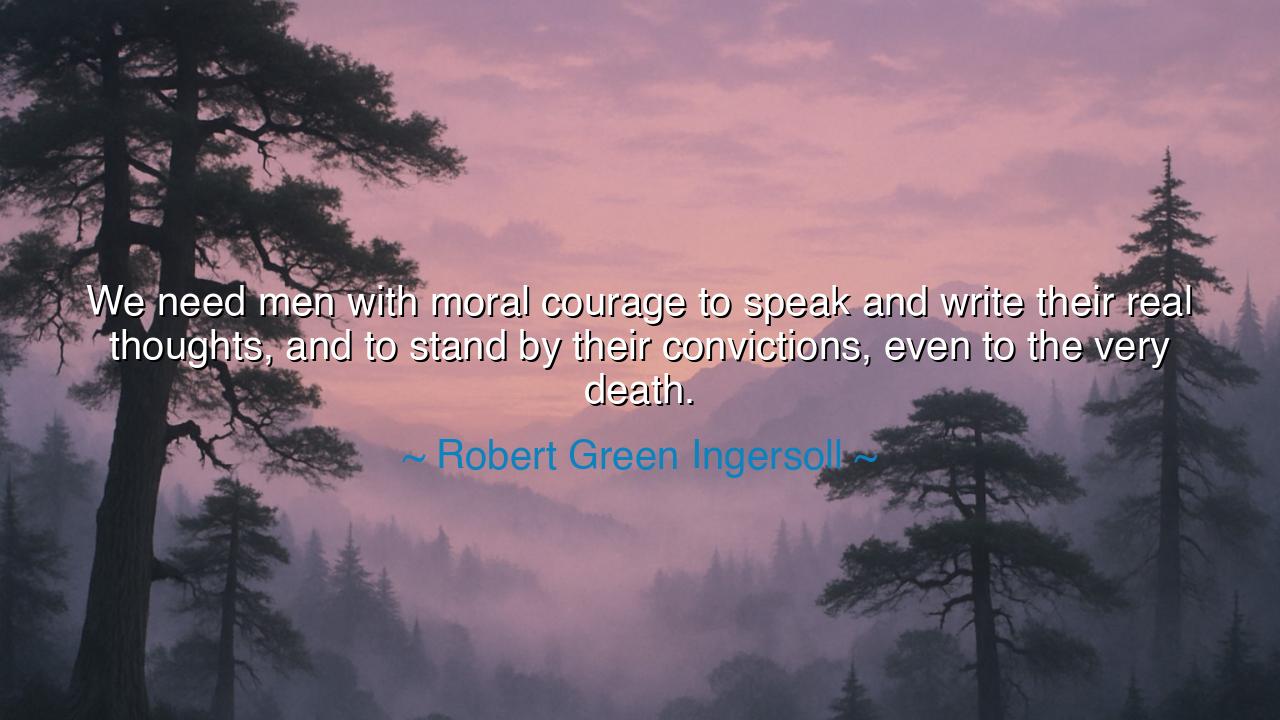
We need men with moral courage to speak and write their real
We need men with moral courage to speak and write their real thoughts, and to stand by their convictions, even to the very death.






In the fire of his words, Robert Green Ingersoll — known as The Great Agnostic, a defender of truth and free thought in an age of conformity — struck a chord that has echoed through centuries. “We need men with moral courage to speak and write their real thoughts, and to stand by their convictions, even to the very death.” These words are not mere rhetoric; they are a call to arms for the soul. Ingersoll spoke as one who knew that truth is the highest form of bravery, and that moral courage — the courage to stand upright before the storm of the world — is rarer than the courage of the sword. For the sword defends the body, but moral courage defends the soul.
Ingersoll lived in a time when the world trembled between faith and reason. The nineteenth century was an age of science, yet also of superstition; an age of progress, yet chained by dogma. To speak one’s true thoughts in such an age was to risk not only reputation, but ruin. Yet Ingersoll spoke — boldly, freely, and without apology. He questioned the established creeds, not out of rebellion for its own sake, but out of a deeper love for honesty. To him, the man who hides his convictions out of fear is already half-dead, while the man who speaks truth, even unto death, is immortal. Thus, his cry resounds: the world does not perish for lack of talent or strength, but for lack of moral courage.
To understand his words, one must look beyond comfort and into the lives of those who carried truth as a sacred flame, knowing it could consume them. Think of Socrates, who stood before the judges of Athens, accused of corrupting the youth with dangerous ideas. Offered the chance to renounce his teachings and save his life, he refused. “The unexamined life,” he said, “is not worth living.” And so he drank the hemlock, calm and unyielding, leaving behind a legacy that still instructs the conscience of the world. In his death, as Ingersoll proclaimed centuries later, we see the living image of what it means to stand by one’s convictions, even unto death.
Such courage is not the roar of defiance, but the quiet firmness of a steadfast heart. It is seen not only in philosophers and heroes, but in every soul who refuses to betray truth for comfort. Consider Galileo, who dared to say that the Earth moves around the Sun — a truth that shook the pillars of faith and power. Threatened with torture and condemnation, he stood by his discovery. Though he was forced to whisper his final words — “And yet it moves” — the whisper carried further than the shout of any tyrant. For truth, once spoken with moral courage, cannot be silenced. It endures beyond fear, beyond death, beyond time itself.
Ingersoll’s message, therefore, is a torch passed from age to age: that moral courage is the foundation of all progress. Without it, justice withers, art becomes hollow, and thought decays into obedience. A world without men and women of conviction becomes a graveyard of silent minds. He calls upon us to remember that freedom is not kept by the sword alone, but by the voice that dares to speak when silence is demanded. For silence in the face of falsehood is the ally of tyranny; but truth, spoken boldly, is the seed of liberty.
Let every generation, then, look inward and ask: Have I spoken my truth? Have I defended what is right, even when it cost me peace? For there will always be moments when conscience whispers against the crowd, when truth demands sacrifice. In such moments, remember Ingersoll’s words — that to speak and write one’s real thoughts is not arrogance, but duty; not rebellion, but devotion to the divine spark of reason within us. For moral courage is not born of anger, but of love — love for truth, for humanity, for the light that guides the soul.
Therefore, my child, fear not the disapproval of the world. Fear only the loss of your own integrity. Speak the truth as you see it, write as your heart compels, and stand by your convictions, though you stand alone. The road of courage may be lonely, but it is the road of the free. Remember always: the tongue of truth is the voice of immortality, and he who dares to use it lives forever in the memory of mankind.






AAdministratorAdministrator
Welcome, honored guests. Please leave a comment, we will respond soon